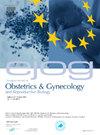Association between low basal serum total testosterone levels and the risk of recurrent pregnancy loss in women with infertility
IF 2.1
4区 医学
Q2 OBSTETRICS & GYNECOLOGY
European journal of obstetrics, gynecology, and reproductive biology
Pub Date : 2025-02-10
DOI:10.1016/j.ejogrb.2025.02.018
引用次数: 0
Abstract
Objective
This study aimed to investigate the association between low basal total testosterone (TT) levels and the risk of recurrent pregnancy loss (RPL) in women with infertility.
Design
The study included women under 40 years with infertility, normal ovarian reserve, and regular ovulation. Participants were categorized into two groups: those with a history of recurrent pregnancy loss (RPL group) and those without a history of miscarriage (control group). All participants underwent in vitro fertilization (IVF) treatment. Serum TT and other sex hormone levels were measured on day 2 of spontaneous menstrual cycles and subsequently evaluated. Endocrine and coagulation conditions were also assessed.
Results
A total of 561 women were enrolled, into either the RPL group (n = 364) or the control group (n = 197) between January 2012 and December 2020. The RPL group demonstrated significantly lower median TT levels and were older compared with the control group (1.21 vs. 1.37 nmol/L, P = 0.001; 34 vs. 33 years, P = 0.010). Additionally, fasting plasma insulin levels were higher in the RPL group (10.67 vs. 8.84 mU/L, P < 0.001). A negative correlation between basal TT levels and pregnancy loss frequency was observed. Low basal TT levels were significantly associated with RPL (OR: 1.58, 95 % CI: 1.04 – 2.41), with TT cut-off value of <1.33 nmol/L indicating an increased likelihood of RPL (P < 0.001).
Conclusion
Low basal serum TT levels are associated with an increased risk of RPL. However, further studies are required to evaluate the predictive value of basal TT levels in RPL risk.
求助全文
约1分钟内获得全文
求助全文
来源期刊
CiteScore
4.60
自引率
3.80%
发文量
898
审稿时长
8.3 weeks
期刊介绍:
The European Journal of Obstetrics & Gynecology and Reproductive Biology is the leading general clinical journal covering the continent. It publishes peer reviewed original research articles, as well as a wide range of news, book reviews, biographical, historical and educational articles and a lively correspondence section. Fields covered include obstetrics, prenatal diagnosis, maternal-fetal medicine, perinatology, general gynecology, gynecologic oncology, uro-gynecology, reproductive medicine, infertility, reproductive endocrinology, sexual medicine and reproductive ethics. The European Journal of Obstetrics & Gynecology and Reproductive Biology provides a forum for scientific and clinical professional communication in obstetrics and gynecology throughout Europe and the world.

 求助内容:
求助内容: 应助结果提醒方式:
应助结果提醒方式:


